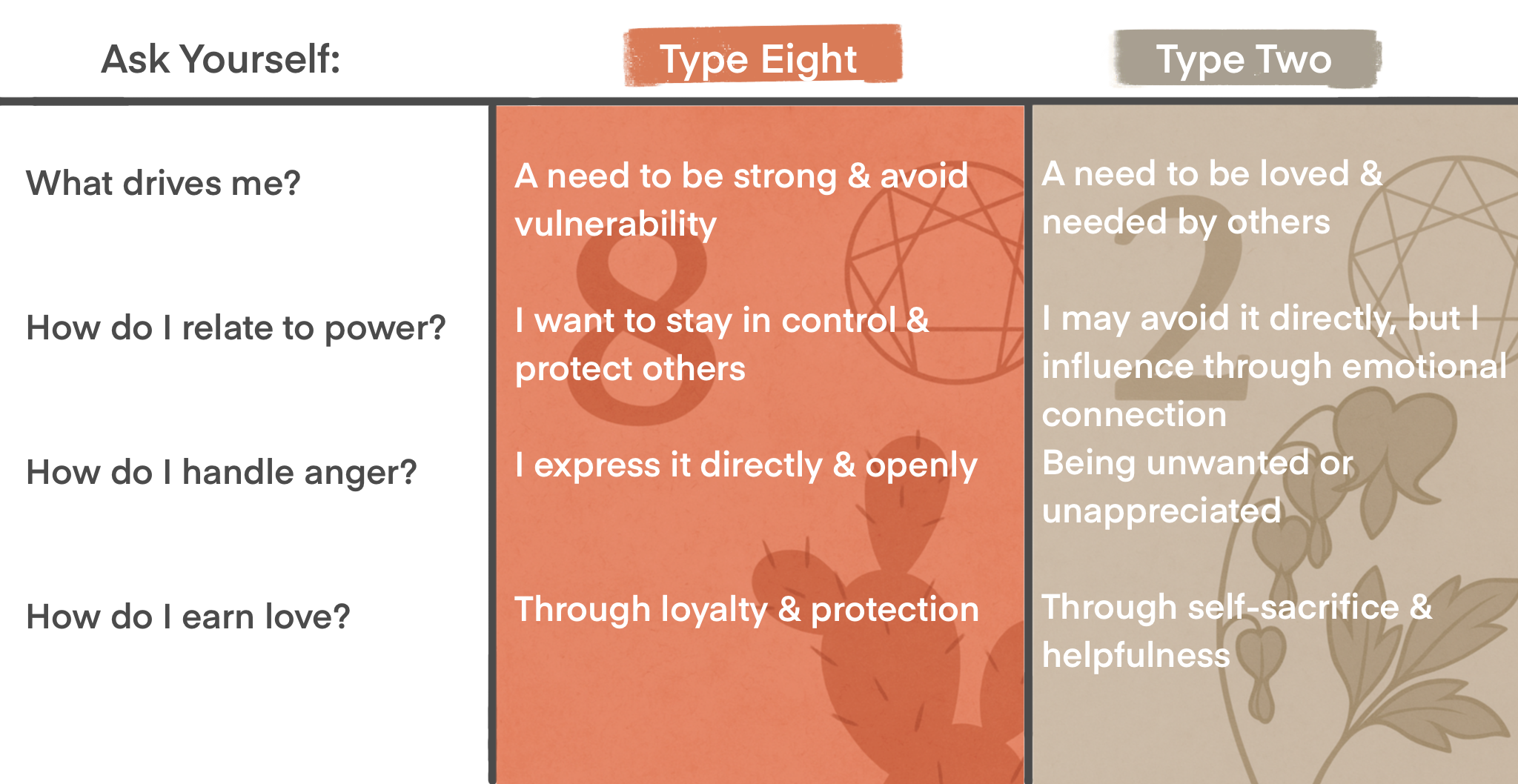In-Depth Comparison
Eights and Twos might seem like odd mistypes, one is direct and commanding, the other warm and accommodating, but their passionate natures and strong interpersonal energy can blur the lines. Both are intense, driven, and highly relational. Both can be leaders, caregivers, and even “too much” for some people. But their motivations and styles are polar opposites.
Eights want to protect themselves from being hurt, so they stay strong, confrontational, and in control. Vulnerability is a threat, and they’ll often lead with power or intimidation when they feel at risk. When they care about someone, they protect them fiercely, but on their own terms.
Twos want to avoid being unwanted or unloved, so they stay helpful, attentive, and emotionally attuned. Vulnerability is how they connect. When they care about someone, they nurture them and hope that love will be returned.
The confusion often happens when a Two has developed a strong will, especially in leadership or caregiving roles. Assertive Twos (often men, due to cultural expectations) can mistake their intensity or control over others as a sign of being an Eight. Likewise, Eights who feel deeply and show intense loyalty may briefly wonder if they’re Twos. But Eights assert power directly, Twos do so indirectly, through people-pleasing, guilt, or emotional appeals.
Eights dominate openly and assertively.
Twos dominate covertly, often in the name of love or helpfulness.
Eights express anger directly and without apology.
Twos repress anger and express it through guilt, frustration, or self-sacrifice.
Eights value independence and control.
Twos value connection and being needed.
Eights say, “I’ve got this.”
Twos say, “Let me help.”
Quick Spot-the-Difference Table
Special Considerations & Deeper Theory
Different Intelligence Centers
Eights are in the Gut Center, focused on control, strength, and resisting vulnerability or betrayal.
Twos are in the Heart Center, focused on emotional connection, approval, and being wanted or needed.
Even when both types are bold, relational, and deeply caring, Eights defend autonomy while Twos seek closeness.
Stress/Growth Movement Crosses Paths
Eights go to Five in stress, withdrawing and becoming analytical or private, traits that don’t resemble a Two at all.
Eights go to Two in growth, becoming more open-hearted, caring, and emotionally available. As they soften and connect more vulnerably with others, they may temporarily resemble Twos, but it’s a movement toward connection, not their core motivation.
Twos go to Eight in stress, becoming more aggressive, controlling, or blunt, traits that may be mistaken for a core Eight.
Many assertive or boundary-pushing Twos, especially in caregiving or leadership roles, believe they’re Eights because they’ve had to “be strong” for others or take charge of difficult situations.
Relational Stance: Assertive/Aggressive vs Dependent
Eights are in the Assertive Stance, orienting toward control and action regardless of others’ opinions.
Twos are in the Dependent Stance, orienting toward others’ emotional needs and approval, even if they deny their own.
This difference is subtle but powerful:
An Eight resists adapting to stay free.
A Two adapts to stay loved.
Overlap in Protectiveness and Loyalty
Both types are fiercely loyal to those they love.
Eights protect through strength and boundary-setting, often becoming defenders of the underdog.
Twos protect through service and sacrifice, often becoming emotional advocates.
This shared protectiveness can blur the line, especially in people who are caregivers, advocates, or survivors of environments where vulnerability wasn’t safe.
Wings & Subtypes May Obscure the Core
A Self-Pres Eight might be nurturing and soft-spoken with trusted people, mistaken for a no-nonsense Two.
The Sexual (One-to-One) Two can appear dominant, jealous, and emotionally intense, often confused with a fiery Eight.
A 2w3 can be highly assertive, polished, and commanding, mistaken for a social Eight.
Common Mistyping Pitfalls
You might think you're an Eight if you're a Two who’s had to lead, advocate, or “hold it all together” for others and who expresses love through control or intensity.
You might think you're a Two if you're an Eight who shows care through action, loyalty, and support, but avoids emotional vulnerability.
Both types resist being seen as “weak,” but Eights hide emotion behind strength, while Twos hide need behind service.
Reflect & Explore
When someone disappoints me, do I express my anger directly (Eight), or try to make them feel guilty (Two)?
Do I pride myself on being strong and self-reliant (Eight), or needed and irreplaceable (Two)?
Am I more likely to take control of a situation (Eight), or offer to help and support (Two)?
Do I feel more threatened by vulnerability (Eight) or by rejection (Two)?

